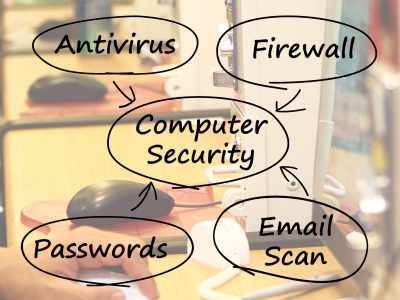Every Windows-based computer can catch a virus every now and then. The key is not to panic, but to remain calm and find a way out of this stressing situation. Read our short guide so you will know how to protect yourself in the future.
Get off the Internet
Once you have realized there is something quite not right you should immediately disconnect from the Internet. Of course, you might have come across an infected disc or a USB stick, but it usually wants to communicate with its server to send your sensitive information. When you isolate your computer you also prevent spreading the virus to other PCs in the network.
Have a deep scan
Scan your computer with your security suite - an anti-virus, anti-malware, and anti-spyware program. If the virus corrupted the files of your suite you may have to reboot your computer and launch the application directly from the CD or DVD. Once the scan is completed and you have found and eliminated the cause of the problem, you should restart your computer and scan it once more, to be on the safe side. This way you can make sure you have gotten rid of the virus completely.
If your suite cannot detect the virus you can try looking up the cause in the Internet, provided that you know where it came from. Finally, you can use Linux to eliminate Windows viruses.

Clean it all up
When you are positive that you have removed the virus you should commence to recover from the damages it has caused. Malware can install new software, uninstall, remove and corrupt files in your programs, and they can even reside in Windows' back-up points, so it would be wise not to use them for restoration. It may be time consuming, but it is much more reasonable to check manually what is missing or not working properly after the infection.
Have an independent back-up
By independent I mean independent from Windows. You can use some removable devices such as a USB stick or an external hard drive, as well as save your data on a cloud. It all depends on what may work the best for you. Backing up your data in a cloud is usually free, as well as reliable.
Make sure you will not fall prey again
If you have just experienced a nasty virus you should definitely focus on enhancing security on your PC. First of all, inspect your anti-virus software. Is it up to date? Is it still good? Sometimes we keep on using the same program for years even though it is not that good anymore. Read some fresh reviews in the Internet and try another suite that has been marked with flying colours.

Furthermore, remember that while the suite is here to protect you it will never work properly if you compromise you safety by opening e-mails from untrusted sources, visiting grayish websites, or installing suspicious software. Make sure you focus on preventing the attacks. Keep in mind that while you may have the medicine, you would not eat potentially poisoned food, so why do you give it to your computer?
